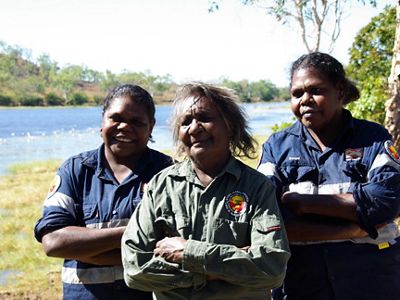Remote Indigenous women to pitch big ideas to global giants
Australian-first event to be held in Queensland
Media Contacts
-
Tony Jupp
Associate Director of Communications
The Nature Conservancy Australia
Email: tjupp@tnc.org
More than 30 female indigenous leaders from remote Australia and the Pacific Islands will pitch their unique business ideas to global giants including Google and Qantas at a special event at the State Library of Queensland on 2 November.
Part of a ground-breaking mentoring initiative set up by The Nature Conservancy (TNC) the evening will see indigenous women travelling long distances from remote communities to participate. Some have never been to a city or travelled in a plane before.
Participants from Arnhem Land and Fish River in the Northern Territory, Papua New Guinea, Solomon Islands and Micronesia will pitch their ideas, which have been developed during a series of intensive workshops, to judges from industry including ANZ, Google and Qantas at the event.

Robyn James, TNC’s conservation director for Melanesia, said there was an urgent need to redefine the role of indigenous women in leadership. High rates of sexual violence, poor political representation and climate change disproportionately affected indigenous women in Australia and the Pacific. “Women’s voices have been ignored for too long and it’s time that changed,” Ms James said. “Women are often responsible for food production in their communities and the relentless effects of climate change has doubled their workload. Poor soil quality, erosion and population pressures have all increased the burden on women and girls. They need to be decision makers for their futures.”
Ms James continued, “We also know that sexual assaults and violence spike after natural disasters. TNC and partners Global Sisters are challenging this power imbalance to create stronger communities and a healthier environment.”

Heather Thompson Chief Operating Officer for Global Sisters emphasised, “Like TNC, we believe that business can be a powerful force for sustainable social and environmental impact, and women must play a role in this work for it to be successful.”
Professional women in the corporate, government and not-for-profit sectors have been mentoring their indigenous sisters in financial management, leadership and marketing. Following a series of intensive workshops, the women have developed environmental projects with a social enterprise angle which will be presented at the State Library event. “We know women are great leaders, and we hope this ongoing initiative will give them the skills to transform their lives and those of future generations,” Ms James said.
More information can be found on the Global Sisters website.
The Nature Conservancy is a global conservation organisation dedicated to conserving the lands and waters on which all life depends. Guided by science, we focus on getting things done efficiently and with the greatest positive impact for conservation. We’re a trusted organisation working in more than 70 countries and territories around the world on innovative solutions to our world’s toughest challenges so that nature and people can thrive together. To learn more about The Nature Conservancy in Australia, follow us on Facebook.
